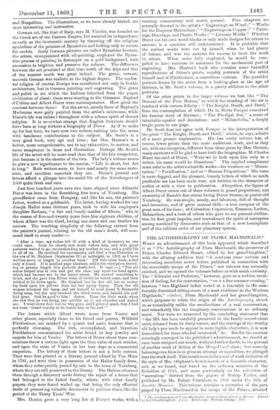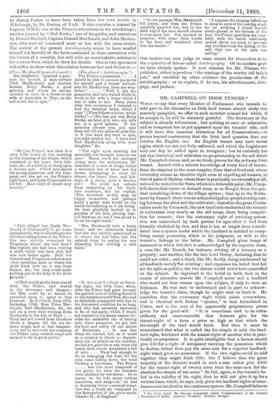THE AUTOBIOGRAPHY OF FLORA MACDONALD.* WIZEN an advertisement of this
book appeared which described it as " 7'he Autobiography of Flora Macdonald, the preserver of Prince Charles Edward Stuart, edited by her granddaughter," with the alluring addition that "it contains some curious and interesting anecdotes never before published in connection with the memorable escape of the Prince," our interest was naturally exicited, and we opened the volumes before us with much curiosity. The "Editorial and Prefatory," however, gave us a sudden revul- sion of feeling, for the conversation, "on a a fine summer evening," between "two Highland ladies seated at a tea-table in the com- fortably-furnished sitting-room of a neat residence in the Western Highlands," videlicet, Flora Macdonald and her granddaughter, which proposes to relate the origin of the Autobiography, struck us as remarkably unlike the recollections of a real conversation, and remarkably like the imaginary conversations in an ordinary novel. Nor were we reassured by the concluding statement that "the MS. has been carefully preserved in the family record-chest until, released from its dusty corner, and the tracings of the worthy old lady's pen made to appear in more legible characters, it is now transcribed for those who feel interested," &c. But for the voucher seemingly conveyed in the publisher's advertisement, we should at once have resigned our minds, without further doubt, to the perusal of another work of fiction of the _Vary-Powell class ; but scarcely believingeven then in so gross an attempt at imposition, we plunged into the work itself. This would seem to be a sort of weak imitation of the style of Mrs. Oliphant's Scotch novels of a domestic character, and, as we found, wag based on the ordinary accounts of the Rebellion of 1745, and more particularly on the collection of " narratives " derived from the papers of Bishop Forbes, and published by Mr. Robert Chambers in 1834 under the title of Jacobite illentoim This volume contains a narrative of the part played by Flora Macdonald in the escape of the Prince, attested • The Autobiography of Flora Macdonald: being the Home Life of a Heroine. Edited by her Granddaughter. 2 vols. Edinburgh : William Nimmo 1810.
by Bishop Forbes to have been taken from her own mouth in Edinburgh, by Dr. Burton, of York. It also contains a journal by Captain O'Neil, one of the Prince's attendants in his wanderings ; another journal by "Ned Burke," one of his guides, and narratives by Donald Macleod, Captain Donald Macdonald, and John Mackin- non, who were all connected more or less with the same events. The author of the present Autobiography seems to have availed himself (or herself) of the facts contained in these narratives with the licence of a novelist, but still with an unmistakable relation to the sources from which he drew his details. One or two specimens will suffice to show what this relation between fact and fiction is :— (The alleged "Autobiography.") The Prince represented, " . . I should be able to procure passports for myself and a female servant, also for MacEachan, from my step- father." . . . . " Well, I got the passports, and only waited while he wrote to his wife a letter which I was to take to her. Many years after this occurrence I chanced to find the identical letter, which I copy" [Then follows a letter, which states] :—" She has got one, Betty Burke, an Irish girl, who, she tells me, is a good spinner. If her spinning pleases you, you may keep her till she spina all your lint, or if you have any wool to spin, you may employ her. I have sent Niel MacEachan along with your daughter," ecc.
"The sight upon entering the miserable hut brought tears to our eyes ! There stood the unhappy young man, the unfortunate de- scendant of a race of kings, before a wretched fire of furze and dry leaves, attempting to roast his dinner, the heart, liver, and kid- neys of a sheep, upon a wooden spit ! We could not refrain from remarking on his desti- tute condition, but he replied, The wretched to-day may be happy to-morrow, and perhaps many a great man would be the better for suffering as I am doing.' He then playfully invited us to partake of his fare, placing him- self between us, but I was proud to be on his right hand."
"Mrs. Macdonald took a hasty leave ; and we afterwards heard that she was strictly questioned as to where she had been, but she quieted them by saying she was returning from visiting a sick bairn." (Flora Macdonald by word of mouth ) Her stepfather "granted a pass- port for herself, a man-servant (Neil MacKechan) and another woman, Betty Burke, a good spinster, and whom he recom- mended as such in a letter to his wife at Armadale in Skye, as she had much lint to spin."
"He [the Prince] was then in a very little house or hut, assisting in the roasting of his dinner, which consisted of the heart, liver, kid- neys, &c., of a bullock or sheep upon a wooden spit. O'Neil introduced his young preserver, and the com- pany, and she sat on the Prince's right hand, and Lady Clanranald on his left. Here they all dined very heartily."
" This obliged her [Lady Mac- donald of Clanranald] to go home immediately, which accordingly she did after taking leave of tho Prince. She was strictly examined by Fergusson where she had been ? She replied, she had been visiting a child, which had been sick, but was now better again. Both the General and Fergusson asked many other questions, such as where the child lived, how far it was from thence, &c., but they could make nothing out of the lady fit for their purpose."
"O'Neil would gladly have stayed with the Prince, and shared in his distresses and dangers ; but Miss could by no means be prevailed upon to agree to that proposal. At 8 o'clock, June 28th, Saturday, 1746, Miss Flora Mac- donald, Neil MacKechan, &c., set sail on a very clear evening, from Benbecula to the Isle of Skye . . . They had not rowed from the shore above a league, till the sea be- came rough, and at last tempest- uous, and to entertain the company the Prince sang several songs and seemed to be in good spirits." "It was now 8 o'clock on Satur- day night, the 28th June, when, after the Prince had gone through the painful task of bidding farewell to the warmhearted O'Niel, who had so faithfully companied with him in his distressed condition for so long, and who had earnestly entreated to be of the party, which I would not consent to, for many reasons be- sides the ostensible one of having only three passports, we got into the boat and safely off the shores of Benbecula. . . . It was fine when we started, but, as is usual in a country in which no depend- ence can be placed on the weather, we had not gone far at sea, when the heavy dark clouds portended a fall of rain. . . . They had enough to do in managing the boat, for the rain came falling down, the wind blowing a hurricane. The Prince . . . was the most composed of the party, for even the boatmen were alarmed by the storm. So to amuse us he told many curious anecdotes, and sang—oh ! he had a charming voice !—several songs. One was a lively air composed on the Restoration of his great-uncle, Charles IL, of England."
fell asleep, and then the Prince dark any of the men should chance surprise, with some little bustle in the boat, and wondered what carefully guarded her, lest in the to step upon her. She awaked in was the matter." "In the passage Miss Macdonald
to sleep in spite of the roaring wind, for on awaking I found myself nicely placed in the bottom of the boat, the Prince guarding me care- fully, with his hands cautiously spread above my head, to prevent any accident from the falling of the sail, that one of the men was
"I suppose the singing lulled me setting."
Our readers can now judge to some extent for themselves as to the originality of this so-called Autobiography. Of its modern garb we have already spoken. It now remains for Mr. Nimmo, the publisher, either to produce "the tracings of the worthy old lady's pen," and establish by other evidence the genuineness of the autobiography ; or to explain, if he can, his advertisement, title- page, and preface.







































 Previous page
Previous page